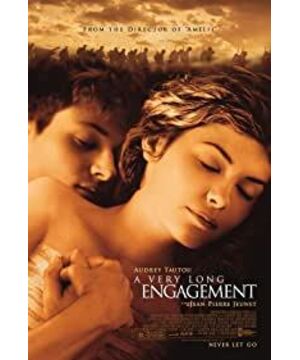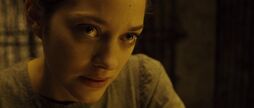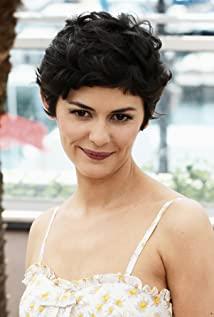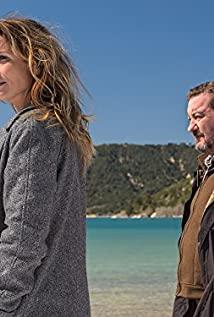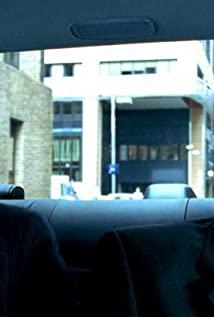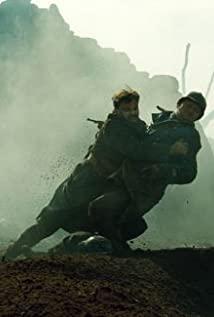The Caesar Award is the highest evaluation award for domestic films in France. It is called the "French Oscar". It is organized and selected by the French Academy of Motion Picture Arts and Technology and France Television Two. The results are produced through voting. It is named after the famous French sculptor Baldasini Caesar (because the Caesar Prize trophy was designed by him). This award began in 1976 and is held annually. In the first session, 13 individual awards were set up, including the best French film, director, screenwriter, and leading actor and actress. In 1982, the best debut award was added. In 1984, the Hope Award for Best Young Male and Female Actor was added. It is not easy for this "Long Engagement" filmed by Jean-Pierre Genay to win five awards in one fell swoop. "Los Angeles Times" commented on the film and said: "Through the film, Genai is telling us that chaos and opportunity control life, and love gives life meaning and value."
The literal translation of the film's title is "A Long Engagement Sunday", and the free translation of "Long Engagement" is more appropriate. This film is adapted from the best-selling novel of the same name by Sebastian Apeliso, whose copyright is added to the production costs of French TV One, increased channels and Hollywood Varnell and other production companies. Although 98% of the actors are French and most of the scenes were shot in France, this co-production was regarded as a foreign film by the French Film Center because of the participation of the American company. The production cost is as high as 45 million euros, which is currently the most invested French film. "Long Engagement" was hailed as the "Best French Film in Three Years" in 2004, with a spectacular scene and magnificent momentum. In contrast to his enthusiastic surrealist romantic style, director Renai turned to portray the cruel and heavy, melancholic humanity of war, while maintaining the eye-popping originality and shocking visually. The main creators of the film, ranging from screenwriters, photography, sound, makeup, etc., to supporting roles of all sizes, are the original cast of "Angel Amelie".
"Long Engagement" spends a lot of ink to depict the battlefield scene of World War I, expressing the cruelty and craziness of the battle with extremely complicated details, and highlighting the atmosphere of war with strong pictures and sound effects. This forms a sharp contrast with the peaceful pastoral life of the heroine in front. The director Jean-Pierre Genay and the heroine Audrey Tartu deal with the warmth themes of war in the same way as "Angel Amelie". The director's noir style also showed a lot in the soldiers' battlefield encounters. The film, like "Angel Amelie", was a big success at the box office. American movie star Roddy Foster also starred. The film won 20 nominations for the French Caesar Awards and won five awards including Best Photography and Best Supporting Actress.
Filming this film is a 10-year dream of director Jean-Pierre Genay. In 1991, he read Sebastian Apeliso's novel and was deeply attracted by the characters in the book. At that time, Rena had just completed his feature film debut "Black Shop Rhapsody", and the right to film this novel was Warner Corporation. For a young director who had just entered the industry and had little name, the filming of "The Long Engagement" was almost It is an unattainable dream. Ten years later, as "Angel Aimei" was greatly appreciated by the world's film circles, Genai rekindled his former passion, and he once again found his magic weapon-Audrey Tato. On the night of the Oscars, Genai asked his "Aimei" if he would continue to cooperate with him, and Audrey Tato readily responded: "Of course, if it is the original crew." Genai decided to shoot in France, and The front and back of the stage were all taken by the French. Warner Corporation accepted Genai's conditions and was willing to pay 35% of the shooting budget. In this way, Genai immediately began to adapt the script together with the screenwriter of "Angel Amelie", after months of meticulous crafting, and at the same time received the support of the original author Sebastian Apeliso. He said to Genay: “Now it’s your child. You can change it as long as you think it fits, but you will come to see me when it’s finished.” Unfortunately, Sebastian Yar was a week before the script was completed. The sudden death of Perisot left a lot of regret for the film.
This film by Genai is one of the few outstanding French films in recent years. In this film, Genay showed the beautiful scenery of France, Corsica and Brittany, and also introduced the works of art by Monet and Daddy. The film restored the Olympic racing station and introduced French architecture and folklore. , Cafes and cooking techniques are really like beautiful postcards. This is the carrier of his imagination and metaphor, and it is also the basis of Renai's movies. He likes small props, newspapers, toys, showcases, shops, and also those stylized and conventional things, just like puppet shows. Like his teacher Sergio Leonard, in Genai's film, he could not let go of his feelings about war. He admitted that he had an experience of the First World War, which was created by Genai. One of the factors can even be said to be an engine.
The film has the shadow of Jules Verne from the beginning to the end, passing through an era when machinery was invented, when trains began to run on the ground, telephones changed people’s communication habits, and then sparkling cars appeared. Director Genai showed us the dream of new machinery and progress. "Long Engagement" tells about the terrible modern war machine, killing, guillotine, and death penalty. Although Matilda has a leg deformity, she desires to run faster than a car. People hope not to be ruled by machines, and hope to run ahead of time. People see hidden behind the big clocks and watches made of machinery. A note of love and hope, human beings look for lost time and love in history. Every moment of the film excites us: the rickety bicycle, the never-ending strong winds of Brittany, the old pop music, the shadows of the trees whirling in the garden, the matches that illuminate the girl's carcass, etc., are all The favorite of this talented filmmaker.
From the perspective of the title "Long Engagement", we can see that people's longing for life and helplessness, endurance to the extreme, can only do something beyond common sense. The story of Meng Jiangnu looking for her husband in a thousand miles praised the great love, but it was also the helpless act of this infatuated woman. In the film, Renai pointed the camera at the huge clock many times, seeming to edit his story on the music score, opened the narrative brackets, and carefully closed it. The excellent movie machine vented his fullness. Belief. The romantic description in the film changed the style of director Renai, and Audrey Tarto became the only warmth element in this cold film, and even her short hair style was well thought out. A lame woman persistently searches for a dream of love shattered by war. The bright-eyed Audrey Tato successfully portrays an intelligent, affectionate and war-weary female image. In addition, it is worth mentioning the strong visual contrast of the film, the peaceful pastoral life and the bloody battlefield, the picturesque Paris in 1920 and the Somme Front that devours life, and the contrast between the first half of the film and the second half of the film. The themes all show the cruelty of war even more. It was a tragedy that Meng Jiangnu searched her husband for a thousand miles, and finally jumped into the sea and committed suicide. And Matilda finally found Manas, but he has completely lost his memory and cannot be counted as a comedy.
On the Somme front, because they could not endure the cruelty and endless suffering of the war, the soldiers used self-mutilation as the only way to escape from life in hell, but they were regarded by the authorities as a desertion and were thrown into the no-man’s land between the French and German forces. . Although they were all pardoned in the end, they did not know that Marshal Petain had signed the order to restore their reputation. The whole story is narrated from Matilda's perspective, through a large number of flashbacks, reflecting this war that brought huge disasters to ordinary people in Europe. In order to create a realistic battlefield landscape, the crew dug a 200-meter-long trench in an area of 20 hectares. Every corner has been carefully decorated. Numerous bullet craters were dug in the no man’s land between the French and German front lines. Plants produce effects that have been devastated by war. Filming of the film started in August 2003 and finished in February of the following year, with more than 200 large and small characters. Before the film was filmed, the French court made a ruling to prevent the state finances from granting aid to the film because the production company is affiliated to Warner, not a pure French company. The film has been screened outside the country of production and has lost the qualification to participate in the Cannes Film Festival.
In 2004, the war romance film "The Long Engagement" received rave reviews after it was released in Europe and the United States. Director Jean-Pierre Genay combines the elements of comedy and tragedy, with extremely impactful visual effects, plus the energetic and passionate performance of the heroine Audrey Tartu. He was praised by critics in 2004. As "the best French film in three years".
View more about A Very Long Engagement reviews


